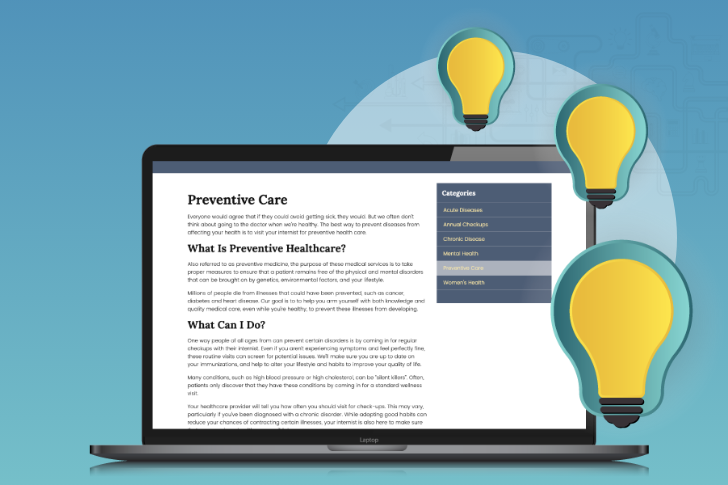By: Jim Rogers
How long does it take to get results with search engine optimization (SEO)?
It’s one of the most common questions we get from clients.
It’s a valid concern because this can be a significant financial investment for many practices.
But search engine optimization is a long-term strategy – not a set-it-and-forget-it addition to your website.
For those willing to put in the time, it can have one of the best returns on investment out of any online marketing strategy.
If you want a better understanding of how search engine optimization works, read on. We’ll show you what makes it so effective and the typical progression of results.
Can We Guarantee Results?
Before we tackle this question, we need to make one thing clear:
No company can make guarantees about search engine optimization.
Any company that says they can get you to page one in a month is not being honest. They might even be using unethical techniques. Those short-term gains will likely get you penalized or banned by Google in the long run.
Not offering any guarantees will make some people uncomfortable. Especially when search engine optimization can be a significant financial investment. But that’s how it works with any reputable company.
There is one assumption we can always make about Google to guide our decisions about search engine optimization: Google wants to help its users.
And there are some things that Google always uses to decide who gets priority in search results.
Let’s look at a few of the most common ones.
How Long Has Your Website Been Around?
Google ranks websites in part based on how long they’ve been on the web. A website that’s been around for ten years has more authority than a website that’s only been around for a month or two. If you’re starting from scratch, it’ll take longer to see results.
A website that’s years old likely only needs to fine-tune their existing strategy. A website that’s still laying its foundations will need more time and effort.
You don’t have to wait for years for your site to build authority, though. There are things you can do to speed up the process.
How Much Quality Content Is on Your Website?
The main reason people use the web is to find information to help them solve a problem.
Help them solve their problems, and you’ll grow your authority and search rankings.
Patient education is one of the most useful kinds of content that a practice can add to its website. And it doesn’t only help your search rankings. Patient education also helps patients trust and recommend your practice more often.
Regular blog posts about helpful topics also help. Seasonal health and preventative care are popular topics with patients. Promoting your content on social media will also boost the quality of your web presence.
The more your website helps people, the more people will notice. And when people notice, Google will notice.
How Many People Link to Your Website?
Google likes to help its visitors. The best way to do that is to give them content that is robust, relevant, and trusted by other patients.
One mark of trust is the number of backlinks that point to your website. Backlinks are other websites that link to your website. Google assumes sites with a lot of backlinks to be more useful and authoritative.
For example, let’s say a patient had a good experience at your practice. If they post about it on an online review site with a link to your website, that link becomes a backlink.
Backlinks can also come from:
-
Blogs
-
Online directories
-
Bing business listings
-
Online review websites
-
Google Business listings
Helpful content and backlinks over time will help you stand out from the competition. Especially in a competitive environment.
How Competitive Is Your Environment?
Search engine optimization results also depend on how competitive your environment is. If you’re in an area with high competition, it will take longer to start seeing results. Patients have more options available to them. Not to mention, more practices are competing for the same keywords.
It’s not impossible to succeed in this kind of environment. If you work on the strategies we talked about earlier, you’ll already be steps ahead of many other practices.
There actually is one strategy you can use to get to the first page results almost right away. But first, consider one thing…
Many Businesses Throw in the Towel Too Quickly
As a general rule, you can expect to start seeing results between 4 – 6 months after you start your search engine optimization program. After that, the results will grow with time.
Return on investment is like a retirement account (don’t worry – it doesn’t take decades). It accrues interest over time and snowballs with regular deposits.
Some businesses spend money on search engine optimization and don’t’ see results for the first month or two. This can make you wonder if you’re wasting your money.
We’ve had clients call us after only a few weeks and ask why they’re still not showing up on the first page of Google!
Sorry – that’s not how it works.
There’s a lot that goes on behind the scenes before you start moving up in the search rankings.
-
Develop helpful content
-
Build links to other websites
-
Promote content on social media
-
Research the keywords and strategies of the competition
-
Give Google time to capture all your links and content across the web
Experts suggest having a budget for 6 – 12 months of search engine optimization before moving forward.
If you’re not able to do this, there’s no need to worry. We do have a lot of options available for any practice in any situation.
Don’t do a few months of search engine optimization and then quit because you didn’t get quick results. You’re better off not spending that money at all.
If you’re willing to make the investment and be patient, search engine optimization has one of the best returns on investment out there.
Let’s talk about one way you can get to the first page while you’re waiting for your website to build traction.
It’s Called Pay-Per-Click Advertising
Pay-Per-Click (PPC) advertisements are ads that Google displays in search results. The keyword a patient types into the search box determines which ad displays.
Say you’re a dentist in Chicago and a prospective patient searches “Dentist in Chicago.”
If you have a paid ad with those keywords, you could take a shortcut straight to the top of the first page.
Why Pay-Per-Click Advertising Is so Effective
Pay-per-click advertising drives traffic to your website when patients are already looking for you.
That’s the best time to show them what you have to offer.
Convirza found that 76% of these types of searches for local businesses resulted in a phone call.
You can target your ads to people within a certain radius. That way your ads only show up to the people who are within driving distance of your practice.
This means you’ll save money because your ads will only display to the people most likely to respond to them.
Keep building up your organic SEO, quality content, and backlinks to your website. Let pay-per-click advertising help you gain traction while everything else is growing.
Why Not Skip Search Engine Optimization Altogether and Pay for Ads?
Some people might want to skip the long-term work of search engine optimization, put up a basic website, and hope that paid ads alone will grow their practice.
But all the components we’ve mentioned in this article get taken into consideration to determine your search ranking.
-
Online reviews
-
Helpful content
-
Number of slingbacks
-
Social media engagement
Only a comprehensive online presence will be able to move its way to the first page of search results over time and have a long-term impact on results.
Search Engine Optimization Has One of the Best ROI’s out There
Now you know how long you can expect to wait before you start seeing noticeable results. And you know what’s happening behind the scenes when it seems like nothing is happening (at first).
While you’re waiting for your website to gain traction, use paid ads to earn new patients and website visitors. You can bring attention to your practice almost right away.
Search engine optimization has one of the greatest returns on investment of any online marketing technique. Stick with it and follow the recommendations of your web presence advisor. You’ll have a website that will beat the competition and grow your practice.
Are you using SEO/PPC as part of your online marketing strategy? Call us today. We can talk more about how to use these strategies in your online marketing strategy. Our Google-certified SEO/PPC web presence advisors are here to help you anytime.



